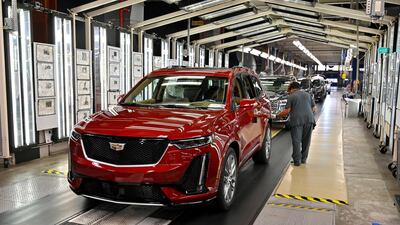General Motors on Wednesday outlined plans for a May 18 restart of most of the North American plants it closed due to the coronavirus pandemic as it reported a stronger-than-expected quarterly profit, sending its shares up 5.3 per cent.
The biggest car maker in the US had previously suspended its 2020 profit outlook because of uncertainty over the outbreak and did not provide an update on Wednesday.
"With the level of uncertainty out there, it's too early to tell until the economy starts to open up," chief financial officer Dhivya Suryadevara told reporters.
But she said that "the second quarter will be the hardest hit" with North American production shuttered for much of the period. She said the coronavirus pandemic had reduced the company's first-quarter profit by $1.4 billion (Dh5.1bn), with about half of that in North America.
The Detroit-based car maker has slashed costs and taken other measures during the Covid-19 outbreak, including suspending its dividend and share buybacks, closing its Maven car-sharing unit, delaying work on some product programmes, reducing marketing budgets and cutting white-collar workers' salaries. It also added $16bn to its cash position by drawing down credit lines.
GM said it ended the first quarter with $33.4bn in automotive cash, including an approximately $16bn drawdown from its revolving credit facilities.
One ray of hope has been China, where the pandemic began but where GM has resumed production. While first-quarter sales there fell 43 per cent, they rebounded to grow by double digits in April. That offers hope for the US market, where sales declined 7 per cent in the first quarter.
"We're certainly seeing green shoots in China," Ms Suryadevara said. "Production has completely restarted and the dealers are seeing increased traffic. Sales are improving."
GM said it is aiming to increase its China market share this year.
Ms Suryadevara said that prior to March the truck segment accounted for 13-14 per cent of total vehicle sales, which jumped to 18 per cent in March and an estimated 21 per cent in April.
"Obviously, truck is our strong suit," she said. "That's something we're going to capitalise on as we restart." She added that pricing on trucks remained strong.
US automotive production ground to a halt in March as the number of Covid-19 infections grew rapidly. But with President Donald Trump pushing for Americans to get back to work and several US states reopening their economies, the focus in the automotive sector has shifted to when production can safely restart.
GM, Ford and Fiat Chrysler Automobiles had aimed to resume production in May and were negotiating with the United Auto Workers (UAW) union, which represents their US hourly workers, about when and how to safely restart.
GM chief executive Mary Barra said on a conference call with analysts that the restart at its plants will be gradual, starting with one shift and then building to two or three shifts depending on demand.
On Tuesday, the United Auto Workers union, which represents GM's US hourly workers in its plants, gave its tacit approval to restart production on May 18.
Fiat Chrysler said on Tuesday it expects most of its North American plants to reopen by May 18. Ford has not announced a restart date.
GM's strategy to restart production relies heavily on social distancing, temperature checks, regular sanitising, improved plant ventilation and use of personal protective equipment.
Michigan Governor Gretchen Whitmer previously extended the state's stay-at-home order through to May 15 but lifted restrictions for some businesses other than manufacturing. Neighbouring Ohio allowed manufacturing to resume on Monday.
Once production resumes, the question will be how fast US demand rebounds, with some dealers expecting big discounts to lure consumers back to showroom floors.
Some industry officials have said some level of government stimulus for the US auto sector will be needed for consumers once the pandemic recedes.
In the wake of the the global financial crisis of 2008-09, the US government rolled out a "cash for clunkers" programme, which offered consumers rebates of up to $4,500 to trade in older gas guzzlers.
GM posted net income attributable to common stockholders of $247 million or 17 cents per share, down more than 88 per cent from $2.12bn, or $1.48 per share in the same period in 2019. Excluding one-off items, GM reported 62 cents per share, well above the 30 cents per share expected by Wall Street analysts.

